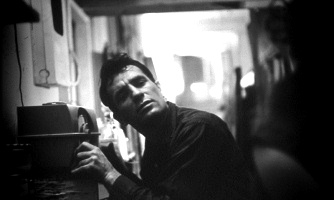Il n'y a aucune raison pour que les neuf numéros de 14' suivant le premier de la série The Stalin Affair by Giles Milton soient de moindre qualité que le numéro initial. BBC Radio 4 a confié l'adaptation de ce livre à la maison de production Pier qu a trouvé en Nigel Anthony le lecteur idoine. C'est un régal.
The Stalin Affair by Giles Milton (1.10) 18 Jun 2024 (numéro en ligne jusqu'au 17 juillet 2024).
2
America has started to provide aid to war-torn Britain in the shape of food, planes, tanks and heavy machinery. But the USA has not, as yet, declared war on Germany. Hitler’s Panzer divisions are racing towards Moscow. Before long they will be pounding on the city gates.
3
August 1941. Churchill meets Roosevelt in Newfoundland and they sign the Atlantic Charter. They agree to send a delegation to Stalin to build a necessary but disagreeable relationship. Averell Harriman and Lord Beaverbrook are sent to Moscow, where they are initially treated with suspicion by Stalin. Eventually, his attitude towards them mellows and a banquet is thrown in their honour. With Moscow under heavy bombardment by German forces, all foreign nationals (including embassy staff) are moved to the city of Kuibyshev – many hundreds of miles east of the capital.
4
December 1941. Following the Japanese attack on the American fleet at Pearl Harbour, the USA enters the war. Churchill, accompanied by Averell Harriman and Lord Beaverbrook, visits Roosevelt in Washington. The industrial might of America is turned over to weapons production. Archie Clark Kerr becomes British ambassador to Moscow and starts to develop a good relationship with Stalin – they crack jokes together, and share a love of pipe smoking.
5
May 1942. Foreign Commissar Molotov is sent by Stalin to visit Churchill in London. He tries to persuade Britain and America to open a second front by launching a joint invasion of Nazi-occupied Europe. German warships attack the convoys bringing supplies from America to Russia. Churchill visits Stalin in Moscow. The two leaders bicker and argue. Stalin reacts angrily and bitterly when told of the postponement of the planned Allied landings in France.
6
Autumn 1942. American aid is now being transported to Russia via the Iranian railway line between the Persian Gulf and the Caspian Sea. In January 1943, the surrender of German troops at Stalingrad signals that the war is on the turn. Churchill meets Roosevelt in Nova Scotia, and Operation Overlord – the Allied invasion of northern France – is scheduled for 1944. Averell Harriman is appointed US ambassador in Moscow. He becomes increasingly concerned by Roosevelt’s naivety about Stalin. Harriman wrote: ‘I gained the impression that Stalin wanted a pulverized Europe in which there would be no strong countries except the Soviet Union.’
7
1943. The journalist Kathy Harriman is in Moscow with her ambassador father. She sets up a glossy magazine, Amerika, to inform Russians about American life - it was published until 1994. The ‘Big Three’ conference takes place in Tehran – the first time Churchill, Roosevelt and Stalin meet face to face. Churchill announces that Operation Overlord would take place ‘no later than May, 1944’.
8
January 1944. American journalists are taken to see the bodies of large numbers of Polish soldiers discovered in mass graves in Katyn Forest. They are told that the Germans had murdered the Poles in cold blood. Many in Washington and London are convinced, however, that the Soviets had committed the atrocity, and feel deeply uncomfortable at having to collude in Stalin’s crimes in order to keep the Allied relationship on track.
9
October 1944. Concerned by the Red Army’s breakneck advance into Eastern Europe, Churchill visits Stalin in Moscow for a second time – and, producing what he refers to as his ‘naughty document’, suggests a deal with him, behind Roosevelt’s back. At the end of January 1945, the ‘Big Three’ meet again at the Yalta Conference – to plan the architecture of the post-war world.
10
February 1945. At the Yalta Conference, Stalin thanks Roosevelt for ‘mobilising the world against Hitler’. There is a genuine belief that America and Britain can continue to cooperate with Stalin in the post-war world. However, the warmth of friendship between the ‘Big Three’ dissipates with alarming speed. Averell Harriman warns that, ‘the world is splitting into two irreconcilable camps’, with the Kremlin camp hell bent on swallowing as many countries in Eastern Europe as possible. It becomes clear that Stalin can no longer be trusted.
The Stalin Affair by Giles Milton (1.10) 18 Jun 2024 (numéro en ligne jusqu'au 17 juillet 2024).
Bibliographie : The danger-loving bisexual diplomat who tamed Joseph Stalin The Telegraph, Katja Hoyer 30 April 2024 .Drawing on astonishing unpublished diaries, letters and secret reports, Giles Milton’s The Stalin Affair reveals troves of new material about the most unlikely coalition in history.
In the summer of 1941, as Hitler invaded the Soviet Union, Stalin’s forces faced a catastrophic defeat which would make the Allies’ liberation of Europe virtually impossible. To avert this disaster, Britain and America mobilised a unique team of remarkable diplomats with the mission of keeping the Red Army in the war.
Into the heart of Stalin’s Moscow, President Roosevelt sent Averell Harriman, the fourth-richest man in America, and his brilliant young daughter, Kathy. Churchill despatched the reckless but inventive Archie Clark Kerr – and occasionally himself – to negotiate with the Kremlin’s wiliest operators. Together, this improbable group grappled with Stalin at his most cunning, to make victory possible. But they also discovered that the Soviet dictator had a terrifying master plan for the post-war world.
It’s 1941, and Britain is under increasing threat from Nazi Germany. Prime Minister Winston Churchill appeals to President Roosevelt for aid. Roosevelt sends wealthy businessman Averell Harriman to London as his special envoy to establish how America can assist. When Hitler launches his shock invasion of the Soviet Union in June of that year, taking Stalin by complete surprise, Churchill and Roosevelt decide to go to Stalin’s aid. But how best to help, and win the trust of, their old enemy?
Read by Nigel Anthony
Abridged by Libby Spurrier
Producer: David Blount
A Pier production for BBC Radio 4
2
America has started to provide aid to war-torn Britain in the shape of food, planes, tanks and heavy machinery. But the USA has not, as yet, declared war on Germany. Hitler’s Panzer divisions are racing towards Moscow. Before long they will be pounding on the city gates.
3
August 1941. Churchill meets Roosevelt in Newfoundland and they sign the Atlantic Charter. They agree to send a delegation to Stalin to build a necessary but disagreeable relationship. Averell Harriman and Lord Beaverbrook are sent to Moscow, where they are initially treated with suspicion by Stalin. Eventually, his attitude towards them mellows and a banquet is thrown in their honour. With Moscow under heavy bombardment by German forces, all foreign nationals (including embassy staff) are moved to the city of Kuibyshev – many hundreds of miles east of the capital.
4
December 1941. Following the Japanese attack on the American fleet at Pearl Harbour, the USA enters the war. Churchill, accompanied by Averell Harriman and Lord Beaverbrook, visits Roosevelt in Washington. The industrial might of America is turned over to weapons production. Archie Clark Kerr becomes British ambassador to Moscow and starts to develop a good relationship with Stalin – they crack jokes together, and share a love of pipe smoking.
5
May 1942. Foreign Commissar Molotov is sent by Stalin to visit Churchill in London. He tries to persuade Britain and America to open a second front by launching a joint invasion of Nazi-occupied Europe. German warships attack the convoys bringing supplies from America to Russia. Churchill visits Stalin in Moscow. The two leaders bicker and argue. Stalin reacts angrily and bitterly when told of the postponement of the planned Allied landings in France.
6
Autumn 1942. American aid is now being transported to Russia via the Iranian railway line between the Persian Gulf and the Caspian Sea. In January 1943, the surrender of German troops at Stalingrad signals that the war is on the turn. Churchill meets Roosevelt in Nova Scotia, and Operation Overlord – the Allied invasion of northern France – is scheduled for 1944. Averell Harriman is appointed US ambassador in Moscow. He becomes increasingly concerned by Roosevelt’s naivety about Stalin. Harriman wrote: ‘I gained the impression that Stalin wanted a pulverized Europe in which there would be no strong countries except the Soviet Union.’
7
1943. The journalist Kathy Harriman is in Moscow with her ambassador father. She sets up a glossy magazine, Amerika, to inform Russians about American life - it was published until 1994. The ‘Big Three’ conference takes place in Tehran – the first time Churchill, Roosevelt and Stalin meet face to face. Churchill announces that Operation Overlord would take place ‘no later than May, 1944’.
8
January 1944. American journalists are taken to see the bodies of large numbers of Polish soldiers discovered in mass graves in Katyn Forest. They are told that the Germans had murdered the Poles in cold blood. Many in Washington and London are convinced, however, that the Soviets had committed the atrocity, and feel deeply uncomfortable at having to collude in Stalin’s crimes in order to keep the Allied relationship on track.
9
October 1944. Concerned by the Red Army’s breakneck advance into Eastern Europe, Churchill visits Stalin in Moscow for a second time – and, producing what he refers to as his ‘naughty document’, suggests a deal with him, behind Roosevelt’s back. At the end of January 1945, the ‘Big Three’ meet again at the Yalta Conference – to plan the architecture of the post-war world.
10
February 1945. At the Yalta Conference, Stalin thanks Roosevelt for ‘mobilising the world against Hitler’. There is a genuine belief that America and Britain can continue to cooperate with Stalin in the post-war world. However, the warmth of friendship between the ‘Big Three’ dissipates with alarming speed. Averell Harriman warns that, ‘the world is splitting into two irreconcilable camps’, with the Kremlin camp hell bent on swallowing as many countries in Eastern Europe as possible. It becomes clear that Stalin can no longer be trusted.





















